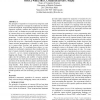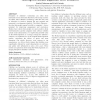98 search results - page 12 / 20 » ACPI: Design Principles and Concerns |
AAMAS
2000
Springer
13 years 7 months ago
2000
Springer
We adopt the decision-theoretic principle of expected utility maximization as a paradigm for designing autonomous rational agents, and present a framework that uses this paradigm t...
ICSE
1999
IEEE-ACM
13 years 11 months ago
1999
IEEE-ACM
The principle of separation of concerns has long been used by software engineers to manage the complexity of software system development. Programming languages help software engin...
CORR
2011
Springer
13 years 2 months ago
2011
Springer
Generating multimedia streams, such as in a netradio, is a task which is complex and difficult to adapt to every users’ needs. We introduce a novel approach in order to achieve i...
CHI
2005
ACM
14 years 7 months ago
2005
ACM
Designers of children's technology are often more interested in user motivation than those who design systems for adults. Since children's technology often has aims such...
MICRO
1999
IEEE
13 years 11 months ago
1999
IEEE
Although PC-class 3D graphics hardware has made significant strides in the last several years, the underlying architectural design principles are still generally considered as a b...


